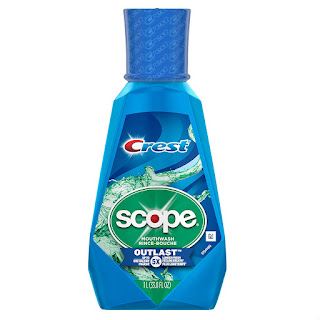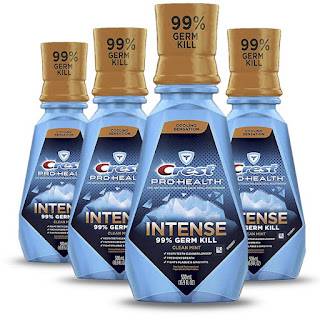7 Best Cetylpyridinium Chloride Mouthwash Brands 2025
A meta-analysis of 3 studies (C19early 2025) concluded that CPC (CetylPyridinium Chloride) may significantly lower risk with viral clearance. One study shows significant benefit. Meta analysis using the most serious outcome reported shows 83% [6‑97%] lower risk. Results are consistent with early treatment being more effective than late treatment.
A study, published in Nature (Takeda 2022) concluded that CPC (CetylPyridinium Chloride) may inhibit SARS-CoV-2 infection even at lower concentrations.
A scientific review, published in the Journal of Formosan Medical Association (2022) also concluded that mouthwash containing CPC shows potential for reducing the viral load of COVID-19 virus in the throat.
Cetylpyridinium chloride (CPC) is obtained by quaternization of pyridine with cetyl chloride
What Does Cetylpyridinium Chloride Do in Mouthwash?
CPC functions by penetrating the cell membrane. This causes cell components to leak, which eventually leads to cell death. It is a well-known antimicrobial agent used in mouthwash to promote gingival health. It has also been used as an antiseptic when treating infections in the mouth and throat.
Cetylpyridinium Chloride Dangers
Cetylpyridinium chloride in mouthwash has been misattributed as a cause of oral cancer in the past, but research has not shown it to link to any form of cancer – no more than any other compound used in mouthwash. The risks of CPC are minor; it is only toxic in large doses (1 gram or more of pure CPC, ingested) and as an antimicrobial spray on food, it is far more helpful than harmful.
Frequent and heavy use of a CPC-based mouthwash or toothpaste can bring side effects, however. Frequent use of CPC-based oral hygiene products can cause minor brown staining on teeth, a slight burning sensation in the gums and the products have been found to promote the formation of calculus (also known as tartar) on some users' teeth. Cetylpyridinium Chloride may also affect the natural microbiome, especially with prolonged use. None of these side effects are particularly harmful, but they should be considered.
Best Cetylpyridinium Chloride Mouthwash Brands
1. Colgate Total Pro-Shield Alcohol Free Mouthwash

Active Ingredients
Cetylpyridinium Chloride (0.075%). Purpose: Antigingivitis/Antiplaque. Inactive Ingredients: Water, Glycerin, Propylene Glycol, Sorbitol, Poloxamer 407, Flavor, Potassium Sorbate, Citric Acid, Sodium Saccharin, FD&C Blue No. 1.
- Antibacterial Mouthwash Provides 12-Hour Protection Against Germs After Eating and Drinking
- Kills 99% of Germs on Contact
- Significantly Reduces Plaque
- Helps Prevent Gingivitis
- Alcohol Free Mouthwash
- No Burn of Alcohol (Does Not Contain Ethanol)
2. Crest Scope Outlast Mouthwash

Crest Scope Mouthwash Ingredients
Water, alcohol (12.25 wt%), glycerin, polysorbate 80, flavor, sodium saccharin, sodium benzoate, cetylpyridinium chloride, benzoic acid, blue 1.
- Keeps breath feeling fresh up to 5x longer vs. brushing alone
- Speak confidently with the #1 fresh breath brand among non-drug mouthwashes
- P&G Calculation based on Nielsen US reported sales for year ending w/o 1/10/2015
- Crest clean meets Scope freshness
- Kills 99% of bad breath germs in lab tests
- Made in the USAwith U.S. and imported ingredients
Gargle twice a day or after having been out for prevention, and three times a day for early treatment of COVID-19.
- Active Ingredient: Cetylpyridinium Chloride
- Kills 99% of plaque germs
- 0% alcohol
- 0% dyes
- 0% artificial flavors
- 0% artificial sweeteners
4. ACT Dry Mouth Anticavity Mouthwash

Ingredients
Water, Sorbitol, Poloxamer 407, Propylene Glycol, Menthol, Methyl Salicylate, Sodium Phosphate, Disodium Phosphate, Potassium Sorbate, Polysorbate 20, Sodium Saccharin, Flavor, Cetylpyridinium Chloride, Caldium Disodium Edta, Sodium Benzoate, Green 3, Yellow 5 (309-039)
- Contains one (1) 18 fluid ounce bottle of ACT Anticavity Zero Alcohol Fluoride Mouthwash Mint Flavor
- ZERO ALCOHOL: This ACT Oral Care Product is an alcohol-free mouthwash
- 3 BENEFITS IN 1: This fluoride mouthwash is designed to help prevent cavities, strengthen teeth and freshen breath
- ACCURATE DOSING CUP: Get the right dose of fluoride with the easy-to-use dosing meter
- DENTIST RECOMMENDED BRAND: ACT Fluoride Mouthwash is the #1 dentist recommended fluoride brand*
- FOR AGES 6 & UP: ACT Fluoride Mouthwash is for adults and kids ages 6 and up
Active Ingredients
Cetylpyridinium Chloride 0.05% Inactive Ingredients Water, Alcohol (15 Wt%), Propylene Glycol, Flavor, Poloxamer 407, Sucralose, Benzoic Acid, Sodium Benzoate, Blue 1, Yellow 6
- 99% Germ Kill with no medicinal taste
- Cooling sensation
- Keeps teeth clean longer
- Freshens breath
- Fights plaque & gingivitis
- Cooling sensation
- Keeps teeth clean longer
- Freshens breath
- Fights plaque & gingivitis
Cetylpyridinium Chloride (CPC), Water, Alcohol (15 Wt%), Glycerin, Flavor, Polysorbate 80, Sodium Saccharin, Sodium Benzoate, Benzoic Acid, Blue 1, Yellow 5
- Kills 99% of bad breath germs in lab tests
- Crest clean meets Scope freshness
- Cosmetic mouthwash
- Made in the USA with U.S. and imported ingredients
- Original Mint Flavor
7. TheraBreath Healthy Gums Periodontist Formulated 24-Hour Oral Rinse with CPC
TheraBreath Healthy Gums Oral Rinse contains cetylpyridinium chloride (CPC), an ingredient approved by the FDA and clinically proven to kill germs linked to gum disease and other periodontal problems, and adds a sweetener, xylitol (but NO saccharin), to neutralize the decay process.
Amazon Best Sellers Rank:
#1 in Anesthetic & Antiseptic Oral Rinses
#4 in Mouthwashes
It has over 23,000 customer reviews, most of them 5-stars.
#4 in Mouthwashes
Related:
European Union Poised to Ban Toxic Dental Amalgam
This article is part of the Dental Care series. Read More > Dental Care





.png)


.png)

Comments
Post a Comment